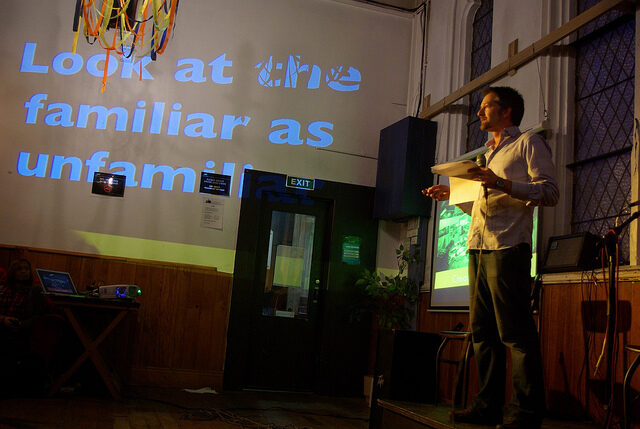Posted by kari.petroschmidt

So Andrew Wallace spoke for us at The Church last week about getting creative. Here’s some commentary.
Andrew characterised a starter as a talker – someone confident, extroverted, a force for something. I agree that starters are generally confident, assertive people. But I think penning any one group with such a particular set of characteristics verges on reductionist. Not all starters are extroverted. In fact, not all of them need to be. As stated in a previous blog post, some start-ups will be longer-term, developmental affairs. Not all will necessitate the kind of assertive rhetoric we associate with marketing or sales oriented start-ups. However, Andrew’s point about listening to criticism was something I’ve heard reiterated by many of the starters from the 2011 cycle. He states,
“If you take criticism of your idea personally, it can’t grow and neither can you. Take criticism as an opportunity to remove the weakness, an early win to success.”
Which brings me to his next point, the importance of the TEAM, as distinct from a group of employees or a ‘staff’. Being a part of a group of people who can assist one another, give each other feedback and complement each other’s skills. I think this is essential, not only to the success of a business but to one’s own sense of personal satisfaction therein. When someone has a close friend at their workplace they are seven times more likely to stay. We all want that sense of connectivity. Of being a part of something bigger, of being valued. Otherwise why do we do the things we do? So too, being a part of a team is about sharing the risk. It’s simple logic – what’s less risky (and consequently sounds better to an investor/bank/whatever), one person taking on $50,000 worth of debt or five people taking on $10,000 worth of debt?
Finally, that interaction between individuals can yield some of the greatest creative fruit. Andrew cited Bill Gates and John Britton as examples, people who worked within teams and who respected their team mates. Consequently the team was more driven to succeed, individuals would push themselves and everyone was extremely dedicated to the enterprise, working seven days a week until the late hours of the morning. Why? Not just because they didn’t want to let the team down. But because they LOVED what they were doing and being part of a team was integral to this. And just look what they created.
Thing is, all these people, with their skills, contacts and creativity are all around you (see the picture below). The key is to find them and though we hate to use the word, that’s what NETWORKING is all about. Just turning up and opening yourself up to opportunities. And what you can achieve in that group dynamic is in many ways far more than you could ever achieve alone.
Finally, I loved Andrew’s point about being a mule. What is the definition of an entrepreneur? It’s someone who can not even show up for work but still get paid. Who is intelligent enough to orchestrate a situation where they don’t have to do the grind-work, but can still profit from the endeavour.Where the number of hours worked is not directly correlated to the money earned. We all feel like mules sometimes. Maybe that’s an inevitable part of working life. But no doubt we’d like to minimise that feeling of the grind as much as we possibly can, starting up being one excellent way of doing exactly that.
Next step – Pitching at The Temple Gallery this Thursday at 5.30pm. See you there!